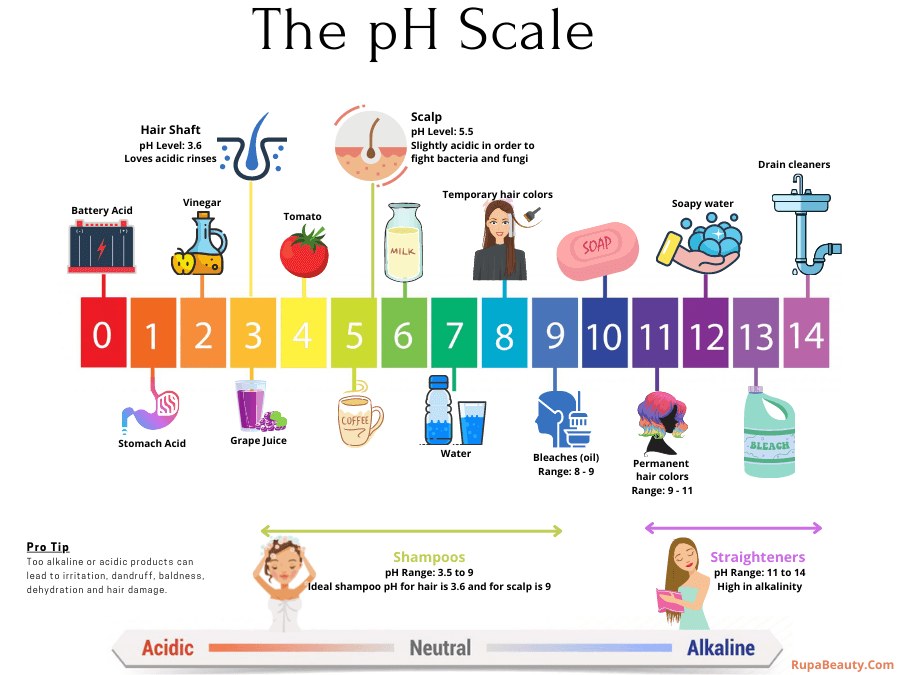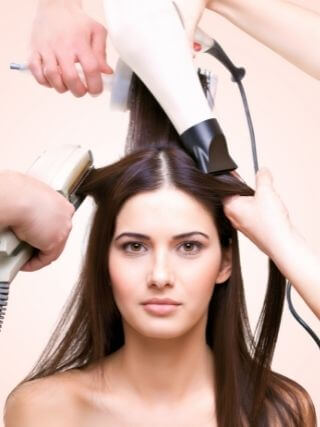When typhoid is the reason for your hair loss, it usually returns to normal on its own. All you have to do now is wait. As your hair regrows, you’ll see small hairs near your hairline that are all a similar length. Within six to nine months, most people’s hair regrows its usual volume. However, it is essential to begin a good hair growth diet at this time to restore the nutrients lost during stressful events.
Table of Contents
What is Telogen effluvium?
Telogen effluvium occurs when several hair follicles on the scalp enter the telogen (rest) stage simultaneously in the development cycle, but the following stage of anagen(growth) does not begin. Hair falls through the scalp, yet no new hair grows. It is caused primarily by a health event, such as delivery operation, or a high fever, or by the start or stop of drugs, such as birth control pills.
Effluvium telogen often starts around three months after the incident. Hair might look thin, but you definitely won’t be totally bald.
Primary reason for hair loss after typhoid
Typhoid is a bacterial infection that can cause a high fever, diarrhea, and vomiting. It can be deadly. Salmonella typhi is the bacteria responsible for typhoid. The infection is usually spread by tainted food and water. Hair loss during and after the fever is common, since typhoid fever interrupts the hair cycle momentarily, resulting in hair loss, a condition known as Telogen Effluvium.
Other Reasons for the Hair Loss during the Typhoid
1. One of the reasons for hair loss during typhoid is the high potency of antibiotics prescribed for patients in the treatment of typhoid fever.
2. In addition to the germs that are eliminated from the body, crucial nutrients that are necessary for hair development are also flushed out, resulting in hair loss.
3. The important vitamin Biotin, which is crucial for hair growth and a significant ingredient of hair present in the Gastrointestinal tract lost, leading hair growth in typhoid patients to be hampered and hair loss to ensue.
4. Hair loss may occur in many situations even 1-2 years after typhoid because bacterial, vitamin and nutritional loss is sometimes substantial.
How long does hair fall persist following typhoid fever?
Telogen effluvium acute is the word used to describe hair loss following any severe illness and its normal duration is approximately 3 months after which period the hair starts growing again. If it lasts more than 6 months, it is referred to as chronic TE and requires medical attention. If it persists for a year, it might cause patterned baldness and hair thinning.
Hair-Fall Treatment after Typhoid
This is a completely reversible condition. Once the triggering event has been addressed (Typhoid in this example), after six months the hair might start to grow again. However, some people may have had this sort of hair loss for years.
What factors play a role in hair regrowth?
Many factors can influence the pace of hair development if you’ve suffered hair loss and are trying to regrow your hair, including:
- Genetics
- Hormonal Change
- Nutritional Deficiencies
- Medications
- Stress and Anxiety
- Other Diseases or Conditions
Hair loss is also caused by antibiotics used for typhoid treatment, which are performed as a flushing germ out of the body but also flush out vital nutrients. These things are not always under your control. Eating a nutritious, well-balanced diet and drinking enough water are your best bets.
Supporting your hair’s growth
There’s no definite technique for your hair to grow more quickly overnight. You should focus on maintaining your hair as healthily as helps to minimize breakage when your hair is growing naturally.
Tips for keeping your hair healthy include:
Well-balanced Diet
Eat a nutritious, well-balanced diet. Foods rich in protein, iron, and Vitamin C in particular. Hair is almost completely comprised of protein, therefore getting enough protein is crucial for hair growth. Chicken, eggs, seafood, nuts, and dry fruits provide the necessary protein and nutrients to maintain your skin and hair healthy. Amla and oranges, for example, are high in vitamin C.
pH Balance of Hair is Crucial
Your pH level has a lot to do with your hair’s capacity to retain moisture and sebum. Sebum is your hair’s natural conditioner, a protective barrier responsible for moisture retention. Moisture is what allows your hair to flex without breaking during manipulation. Hair becomes brittle and prone to breaking when it lacks moisture. Always remember to keep your hair moisturized since it is essential to its flexibility and natural hair development. Chemical treatments, such as dyes and relaxers, change the pH of your hair, weakening protein structure and resulting in dry, brittle hair, which eventually hampers hair development. This happens when your pH balance changes suddenly or dramatically, and your alkalinity rises. To preserve the pH balance of your hair, rinse it with organic apple cider vinegar.

Taking Supplements
Consult a doctor about taking supplements, specifically iron, folic acid, biotin, omega-3 and omega-6 fatty acids, and zinc, but only if you believe your diet is lacking in these nutrients. There is no need to take supplements if you are obtaining all of your nutrients from your diet.
Check the guide on Best Vitamins for Stress and Hair Loss Prevention
Use Mild Shampoo
There are no harsh substances in mild shampoo and it is quite gentle on your scalp and hair. It comprises natural conditioning elements that are not generally found in shampoos, which is an excellent option for this alternative. These shampoos also include natural ingredients that support healthy hair growth and offer necessary nutrients. This shampoo gently cleanses the scalp carefully without leaving it dry, irritable or tight. This also helps to regulate the pH of the scalp in the cause of dandruff and hair loss. It is good for every type of hair and may also be used for delicate scalps.
Thanks to no additional artificial scents, these shampoos have a very mild aroma unlike other shampoos with the smell of chemicals. Mild shampoos are made up of natural substances and that’s where this relaxing mild aroma comes from.
Apply Essential Oils
Applying essential oils straight to your skin is not a good idea. A few drops of essential oil per ounce of carrier oil can be used to dilute the oil. According to one research, pumpkin oil boosts hair count by 40% in males with hair loss. Rosemary and peppermint oil are two additional oils that may be beneficial.
These essential oils can also be used with other carrier oils that protect hair from damage, such as:
- castor
- coconut
- mineral
- sunflower
Keep Chemicals & Extreme Heat Away from Hair

Avoid using harsh chemicals or applying extreme heat to your hair and skin. Chemicals used in coloring, lightening, and perming procedures are intended to penetrate the outer protective cuticle and directly influence the inner cortex. Disulphate bonds, which hold keratin polypeptide chains together, are broken down by perming chemicals. Severe damage can result if the hair and scalp are overexposed to these substances. The heat from a curling iron, straightener, blow dryer, or dryer hood breaks the temporary connections that keep polypeptide chains together in the hair. Hair can then be styled in a different way. Heat damage to the hair structure can be irreversible, and it can also harm the scalp, resulting in hair loss.
Amla the Food of Hair
Amla is regarded as a “superfood” for hair. This ‘wonder fruit’ has a plethora of nutrients such as vitamins, minerals, amino acids, and phytonutrients, making it a hair fall control cure and natural conditioner. Amla is high in vital fatty acids, which permeate the follicles and make the hair smoother, shinier, and more voluminous. This fruit even boosts hair growth due to its rich iron and carotene content. Amla is also strong in antioxidants, which assist to keep the scalp healthy.
Amla paste for hair may be made by mixing it with other herbs that encourage hair development, such as Reetha and Shikhakai. Apply raw amla juice to your hair three times a week.
Avoid tight ponytails and braids
Traction alopecia is caused by anything that pulls on the hair, eventually damaging the root and leading to scarring and permanent hair loss, according to Doris Day, a dermatologist and clinical associate professor of dermatology at New York University Langone Medical Center who specializes in hair loss. It is a lengthy procedure that generally takes years. Tight braiding, tight ponytails, or even simply pulling at the hair might be underlying reasons.
Homemade Hair Packs
Fenugreek and yogurt, egg yolk, and green tea are some fantastic hair packs to try. The good bacteria in yogurt reduces scalp infection, Fenugreek boosts hair growth from the follicle. The antioxidants in green tea help to prevent hair loss and promote hair growth, whereas the protein, vital vitamins, and nutrients in egg yolk strengthen and embellish your hair.
Use Bhringraj Oil (Eclipta alba extract)
Bhringraj is also known as a false daisy is an ayurvedic herb. A 2008 research on albino rats using Bhringraj discovered that the time required to complete hair growth was considerably decreased when compared to the control group using a 2 percent solution of Minoxidil. However, because the study focused on rat follicular development, the Eclipta alba hair extract outcomes cannot be guaranteed to be the same in humans.
According to a 2011 study, Bhringraj oil contains antibacterial and antifungal characteristics that can aid in the reduction of dandruff. The oil also contains anti-inflammatory qualities, which can assist with psoriasis and other scalp skin irritations. It is also claimed to enhance scalp blood circulation.
Bhringraj also has vitamin E, which has the ability to combat free radicals, which can hinder hair development.
Trimming Split Ends
Split ends can be easily eliminated with a trim. Imagine a rope that has come loose at the ends and is still unwinding. That is how split ends the function. And, no matter what product the advertisements claim, you can’t put separated ends back together. If the frayed ends are not removed, hair continues to break along the hair shaft, resulting in roughness and frizziness that looks straw-like and full of loose ends. Cutting the ends above the damage is the only method to prevent the splitting. Even if you’re attempting to grow out your hair, trimming it every six to eight weeks will result in healthier hair because you’re eradicating the major cause of damage.
Sun protection
Protect hair by wearing a hat against excessive sun exposure. UVA and UVB radiation may remove the moisture from the hair and damage proteins and cuticles, resulting in dry and crunchy ends, frizziness, split ends or even decoloration, if exposed to too much sunshine.
Quit smoking
Smoking may cause hair follicles to damage your hair and raise the chance of hair loss.
A 2020 research showed the prevalence of androgenic alopecia in the early inception between 20 and 35 years of age in males and non-smokers. Androgenetic alopecia is also known as male or female patterns baldness. The researchers observed that there was a certain amount of hair loss in 425 of 500 smokers, whereas only 200 of 500 smokers had hair loss.
Smoking may also contribute to oxidative stress. Smoking causes your body to produce more free radicals. Free radicals are molecules that quickly react with other molecules in your body, posing a risk of damaging your cells’ DNA. When the body’s free radical activity is too high, it causes oxidative stress. In the 2018 study, a specific sensitivity to oxidative stress has been discovered in the hair follies of balding scalps.
In a previous 2003 study, scientists claimed that harmful substances in tobacco smoke might cause cells in the hair follicles to damage the DNA. Damage to the cells’ DNA may result in a hair growth impairment.
Tobacco chemicals might adversely affect your blood flow and cardiovascular health. According to the FDA, smoking increases plaque accumulation in your blood vessels, increasing your chance of developing illnesses including blood coagulation, cardiac attack, and stroke. Your hair follicles are nourished by blood vessels, which allow nutrients to be delivered and waste to be eliminated. Hair loss or hair damage can be caused by the poor blood supply to the scalp.
Quitting smoking can be tough, but a doctor can assist you in developing a smoking cessation strategy that is tailored to your specific needs.
Drink Water for Healthy Hair
For natural hair development, drinking water is essential. Like our body, which is high in water, we have at least 25% water in our shaft. Water, therefore, boosts the development of hair.
Just as water replenishes the human body and promotes numerous essential processes, it also stimulates hair follicles by enhancing the absorption of vitamins and minerals.
Drinking enough water helps to keep your hair moisturized. As a result, hair loss, hair fall, dry hair, brittle hair, and itching may all be avoided. Water aids in the removal of toxins from the body. This not only helps the human body operate properly but also promotes hair growth and health. Toxins limit hair development and can cause a variety of biological problems.
Use Protein Treatment
Protein therapy promotes hair growth while also protecting it from toxic and environmental harm. If you frequently style or use heat on your hair, a protein treatment might help protect it. Coconut oil is a great option for a homemade protein treatment. It is high in healthy fats and proteins, making it an excellent natural protein therapy for damaged hair. Applying a coconut oil mask to your hair can provide a low-cost, deep-moisturizing treatment with excellent results. Both before and after washing hair, coconut oil aids in the reduction of protein loss.
Caffeine is good for your follicles
Caffeine’s effects on hair growth are still being studied, however, a cell study revealed that caffeine may boost hair growth. Also, a 2020 research project showed that coffee has some significant benefits over Androgenetic Alopecia.
Hair loss affects both men and women as they get older. Coffee applied topically to the hair and scalp may help to prevent hair loss and stimulate hair growth. Hair loss in men is usually caused by the sex hormone dihydrotestosterone (DHT), which harms hair follicles. Hair loss can occur in women who have too much DHT.
Damage to the hair follicle progressively develops, which leads to baldness. But caffeine in coffee can contribute to accelerate hair development and prevent hair loss, according to studies.
In a 2007 laboratory research, coffee was found to help inhibit the effects of DHT in male hair follicles. It promoted hair shaft elongation, resulting in longer, broader hair roots. It also increased the duration of anagen, which is the phase of hair development.
Caffeine was also examined for its effects on female hair follicles, and it was discovered to have a growth-stimulating impact on female hair follicles as well.
Caffeine, as a stimulant, stimulates blood circulation to hair follicles. This also helps hair grow quicker and stronger, providing the impression of fuller, thicker hair.
If the hair is dull, broken, or dry, it can restore its look by adding moisturizers. Surprisingly it might also enhance dullness by rinsing your hair with coffee. because there are flavonoid compounds present in coffee that stimulate hair growth. This can help to reduce frizziness and make hair smoother and easier to untangle.
If you’re seeking to naturally dye grey hair or deepen your hair color, a coffee rinse can help. Because coffee has a dark hue, so it’s like a hair stain. If you have brown or black hair, this is a simple cure for concealing grey strands. Use strong coffee like espresso for optimum effects.
The Bottom Line
Come up with a strategy and be consistent if you want to stop your hair fall. Note that it may take a couple of months for therapy to have significant benefits. Stay optimistic and make all possible efforts to keep your hair therapy in a healthy lifestyle.
If these natural approaches do not work for you, see your doctor regarding medicines or treatments.

Creative, versatile, and passionate about her craft, Rupa Das is a well-recognized name in the world of fashion and makeup! This is a woman who has been in the fashion and makeup industry for 24 years and is still one of the leading international makeup artist in the circuit! She has worked in big brands like Lakme, Green Trends, Colors and transitioned to become a Beauty (Hair & Skin) Trainer.